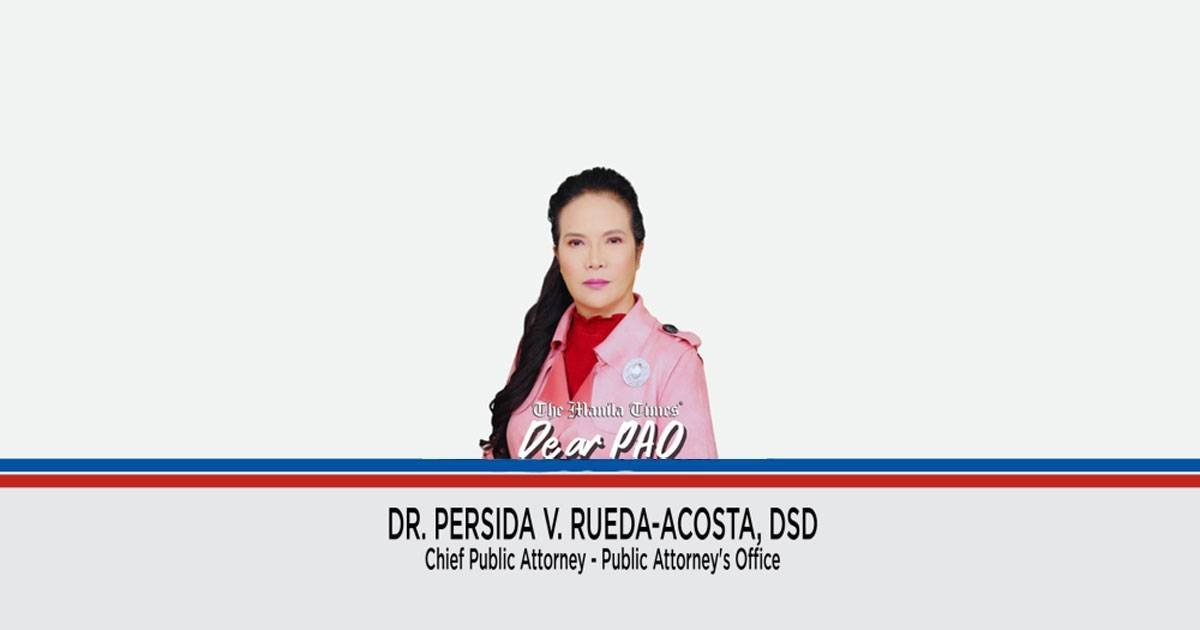
Dear PAO,
My uncle was deeply asleep on his swing chair outside his house when a creditor arrived to demand payment. Startled and awakened by the victim’s hands that touched him, my uncle, who was a former soldier, instinctively but unconsciously threw a punch to the creditor, which caused the latter to fall to his death. During arraignment, my uncle raised “accident” as a defense. Isn’t it right that the prosecution must establish my uncle’s guilt beyond a reasonable doubt before he sets up his defense?
Brixton
Dear Brixton,
When an accused invokes the affirmative defense of an accident, the burden of proof shifts to him to prove his defense. It then becomes incumbent upon him to rely on the strength of his own evidence and not on the weakness of the evidence of the prosecution. Even if the evidence of the prosecution is weak, it can no longer be disbelieved after the accused admitted to the commission of the crime. Corollary, the accused can no longer be acquitted unless he or she successfully proves, by clear and convincing evidence, the existence of the essential requisites of accident as an exempting circumstance.
This opinion finds support in the recent decision of the Supreme Court in the case of People v. Leocadio, GR 227396, Feb. 22, 2023, penned by Associate Justice Mario Lopez, where it held:
“Notably, Milo conceded during trial that he killed AAA227396 but disavowed criminal liability since it was supposedly accidental. Milo alleged that he unconsciously boxed AAA227396 on the chest after she abruptly awakened him. The argument is specious. The Revised Penal Code (RPC) is explicit that ‘any person who, while performing a lawful act with due care, causes an injury by mere accident without fault or intention of causing it’ is exempted from criminal liability. The exempting circumstance of ‘accident’ is anchored on the complete absence of intent or negligence on the part of the accused. In other words, the accused does not commit either an intentional or culpable felony. The accused commits a crime, but there is no criminal liability because of the complete absence of any of the conditions which constitute free will or voluntariness of the act. Moreover, accident is an affirmative defense which the accused is burdened to establish with clear and convincing proof. The accused must rely on the strength of his own evidence and not on the weakness of that of the prosecution. Thus, it is incumbent upon the accused to prove the essential requisites of the accident as an exempting circumstance, namely: (1) a person is performing a lawful act; (2) with due care; (3) he/she causes an injury to another by mere accident; and (4) without fault or intention of causing it.” (Underscored provided)
From the foregoing, it is clear that when your uncle admitted the commission of the crime but interposed the exempting circumstance of accident, the order of trial is reversed. Hence, your uncle, who is the accused in that case, must first establish his defense to overturn the presumption that he was guilty of the crime of which he was charged.
We hope that we were able to answer your queries. This opinion is solely based on the facts you have narrated and our appreciation of the same. This opinion may vary when the facts are changed, altered, or further elaborated. We hope that we were able to enlighten you on the matter.
Editor’s note: Dear PAO is a daily column of the Public Attorney’s Office. Questions for Chief Acosta may be sent to [email protected]






